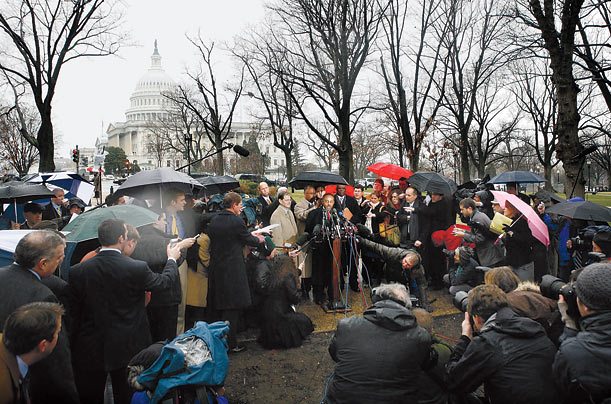
A classic tale of Chicago politics involves a young man eager to plunge into a Democratic campaign. The skeptical ward boss asks who sent him. "We don't want nobody that nobody sent," he snarls.
Chicago's Roland Burris had the opposite problem when he strode into the U.S. Capitol to succeed Barack Obama as the junior Senator from Illinois. Senate majority leader Harry Reid didn't want nobody that somebody sent — if that somebody was Illinois Governor Rod Blagojevich, arrested in December on charges that he was plotting to sell Obama's seat. Burris, who wasn't accused of any wrongdoing, was rebuffed by the secretary of the Senate. Instead of entering the chamber's cozy confines, where he would have stepped into Obama's role as the lone African American, he retreated in a chill rain before a flock of cameras.
For those who see politics as a chess game for scoundrels, it was all great fun. Free on bail, refusing to resign, brassy Blago had turned the tables on rectitudinous Reid. In Illinois a person is governor until proved guilty, and some legal scholars opined that Burris had the bona fides even if they were issued by a character out of The Sopranos. Within hours, Senate Rules Committee chair Dianne Feinstein broke with Reid, calling for Burris to join the club. The Senate leader, out on a limb that his comrades were sawing off, soon softened his opposition. "[Bleep]ing golden," the cynic might say, borrowing from the Blagojevich idiom as allegedly captured on a federal wiretap.
Will Rogers could count on a chortle whenever he said, "I belong to no organized party. I am a Democrat." But these are serious times: the same day the Senate convened with two Democratic seats unfilled (comedian Al Franken's microscopic margin of victory is being contested in Minnesota), Obama announced that the nation could soon face a trillion-dollar deficit. Instead of serious leadership, Congress gave us the Burris showdown — in which gall challenged sanctimony while insincerity vied with incompetence.